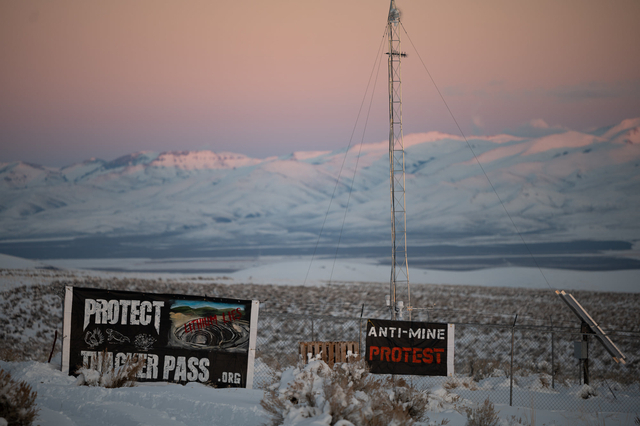
- Details
- By Darren Thompson
RENO, Nev.— Construction is underway on the highly contested Thacker Pass lithium mine in northern Nevada after a court ruled earlier this month against the tribes trying to stop the mine.
After U.S. District Court Judge Miranda M. Du ruled on Feb. 6 against conservation organizations, a local rancher, and several tribes who filed suit to stop the project, three separate federally recognized tribes filed an additional lawsuit on Feb. 16 in an attempt to stop construction of the mine.
On March 23, the court ruled against the tribes — the Reno-Sparks Indian Colony, Summit Lake Paiute Tribe, and the Burns Paiute Tribe — who argued that the Bureau of Land Management violated several laws when it permitted the mine to Lithium Americas on Jan. 15, 2021. The tribes also alleged that the mine’s permission violates their access to historically and culturally significant sites.
The Thacker Pass region is considered sacred by the tribes who call it “Peehee Mu’huh,” or Rotten Moon in the Paiute language because, in 1865, federal cavalry killed more than 30 men, women and children and then left their bodies to rot.
Judge Miranda Du said that access to the Thacker Pass region has been restricted for years because of authorized mining activity, and an argument that its restriction suddenly limits cultural rights is not valid.
The court previously rejected evidence presented by the Reno-Sparks Indian Colony and the Burn Paiute Tribe that a massacre occurred in the area. The two tribes presented written records and two eyewitness accounts of the slaughter.
The newest lawsuit also contended that the BLM misrepresented its claims that it consulted with tribes about potential impacts on historical and cultural sites near the mine project site.
“Our contention is with the largest lithium mine in the country and the expansion of the 40 plus other lithium claims proposed for the State of Nevada,” said Arlan Melendez, Chairman of the Reno-Sparks Indian Colony, in a statement on Feb. 17. “They should have notified all Tribes sooner. The Thacker Pass permitting process was not done correctly. BLM contends they have the discretion to decide who to notify or consult with. They only contacted three out of the 22 tribes who had significant ties to Thacker Pass.”
The three tribes behind the lawsuit said Thacker Pass should be listed on the National Register of Historic Places.
“Part of the Federal Government’s responsibility is to determine if a proposed mining project may adversely affect historic properties,” said Reno-Sparks Indian Colony’s Tribal Historic Preservation Officer Michon Eben in a statement. “Historic properties include Native American massacre sites. The BLM [Bureau of Land Management] failed in its trust responsibility to tribes and now our ancestor’s final resting place is currently being destroyed at Peehee Mu’huh.”
Lithium Nevada Corporation (LNC), the subsidiary of Lithium Americas, said in a news release that it began construction of what is being touted as the largest lithium mine in North America on Mar. 2. According to the company, lithium reserves at Thacker Pass can support the production of up to 1 million electric vehicles a year for up to 40 years. Production of materials could begin as soon as the end of 2026.
Lithium Americas did not provide a comment on the most recent ruling as of press time.
More Stories Like This
Oak Ridge Fire On Navajo Nation Grows to 9,846 AcresOak Ridge Fire Burning on Navajo Nation Grows to 6,300 acres
Charles F. “Chuck” Sams III Joins Oregon Law as Inaugural Oregon Tribes Scholar-in-Residence
Interior Department Moves to Expand Oil and Gas Development in Alaska’s National Petroleum Reserve
Feds Release Final Environmental Impact Statement on Oak Flat Mine
Help us tell the stories that could save Native languages and food traditions
At a critical moment for Indian Country, Native News Online is embarking on our most ambitious reporting project yet: "Cultivating Culture," a three-year investigation into two forces shaping Native community survival—food sovereignty and language revitalization.
The devastating impact of COVID-19 accelerated the loss of Native elders and with them, irreplaceable cultural knowledge. Yet across tribal communities, innovative leaders are fighting back, reclaiming traditional food systems and breathing new life into Native languages. These aren't just cultural preservation efforts—they're powerful pathways to community health, healing, and resilience.
Our dedicated reporting team will spend three years documenting these stories through on-the-ground reporting in 18 tribal communities, producing over 200 in-depth stories, 18 podcast episodes, and multimedia content that amplifies Indigenous voices. We'll show policymakers, funders, and allies how cultural restoration directly impacts physical and mental wellness while celebrating successful models of sovereignty and self-determination.
This isn't corporate media parachuting into Indian Country for a quick story. This is sustained, relationship-based journalism by Native reporters who understand these communities. It's "Warrior Journalism"—fearless reporting that serves the 5.5 million readers who depend on us for news that mainstream media often ignores.
We need your help right now. While we've secured partial funding, we're still $450,000 short of our three-year budget. Our immediate goal is $25,000 this month to keep this critical work moving forward—funding reporter salaries, travel to remote communities, photography, and the deep reporting these stories deserve.
Every dollar directly supports Indigenous journalists telling Indigenous stories. Whether it's $5 or $50, your contribution ensures these vital narratives of resilience, innovation, and hope don't disappear into silence.
 The stakes couldn't be higher. Native languages are being lost at an alarming rate. Food insecurity plagues many tribal communities. But solutions are emerging, and these stories need to be told.
The stakes couldn't be higher. Native languages are being lost at an alarming rate. Food insecurity plagues many tribal communities. But solutions are emerging, and these stories need to be told.
Support independent Native journalism. Fund the stories that matter.
Levi Rickert (Potawatomi), Editor & Publisher
